Chinglish
David Henry Hwang
San Francisco Playhouse
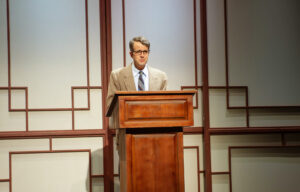
With a congenial big smile behind the center-stage lectern, American businessman Daniel Cavanaugh punctuates his talk on “Doing Business in China” with examples how Chinese interpreters often massacre common English phrases in commercial signage, with “Chief Financial Officer” becoming “Financial Affairs Is Everywhere Long” and “Dry Goods Pricing Department” turning into “F—k the Certain Price of Goods.” With that introduction, the evening of constant hilarity of David Henry Hwang’s Chinglish at San Francisco Playhouse has just begun. The fun launches full steam when we revert to a scene three years earlier when Daniel first arrives in China to pitch his American signage company to a Chinese Cultural Minister in Guiyang. Not only do we now hear how “Handicapped Toilet” signage became “Deformed Man’s Toilet” in a recent, local project; but we laugh aloud as real-time misinterpretations lead to a plethora of the language mix-ups and cultural misunderstandings that our global, no-more-borders world has spawned.
In Chinglish (a word meaning the mash-up of Chinese and English), David Henry Hwang deftly and deliciously constructs a script ripe for the tightly-paced, tongue-in-cheek, tantalizing direction of Jeffrey Lo. He guides a SF Playhouse cast that is stellar in comedic prowess and stunning in their collective abilities to speak fluent Chinese. The result is a highly entertaining evening that lets us as an American audience enjoy a somewhat-clueless American entrepreneur’s adventures and misadventures, largely from the Chinese perspective. It is almost as if we were watching a situational comedy program on Chinese TV about a good-hearted but naïve American colliding with native, Chinese culture (aided in our understanding by two, ongoing projections of translations into English of the Chinese being spoken). How perfect is San Francisco Playhouse’s timing to open during Asian Appreciation Month a play that celebrates Chinese language, customs, quirks, and culture in a fun but enlightening manner.
Director Jeffrey Lo is especially to be commended in striving to deliver the script’s Chinese – the language of at least a quarter of all words spoken – in the authentic dialect spoken in Guiyang, China. To this end, dialect, language, and cultural consultant Patrick Chew deserves huge kudos as he has prepared the cast – five of the seven who are Chinese Americans – to deliver a script that can be enjoyed by members of the audience who are Chinese in their heritage language, something almost unheard on American stages and something particularly special for a city like San Francisco.
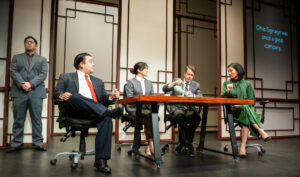
As Daniel Cavanaugh, the owner of the Cleveland company trying to gain a first contract in China to do signage for a new cultural center in Guiyang, Michael Barrett Austin is hilarious in portraying this fish out of water as he initially tiptoes and stumbles through his first meeting with Chinese officials to make his proposal. He struggles to know whether to sit, stand, speak, or listen politely when all around him are people speaking in rapid-fire, musical click-clacks a language he has not one word of knowledge. His bright-eyed eagerness and awkwardness often reminds one of a young kid in a room full of adults trying to get a word in during a conversation he does not really understand. But over time, his Daniel sheds his rather cute, cautionary ways and becomes increasingly assertive as he begins to navigate into this high-relationship, full-of-secrets, closely-followed-norms world of Chinese business dealing.
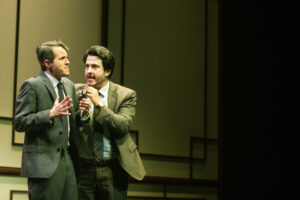
Daniel is relying on his newly acquired business consultant, Peter Timms, for guidance how to succeed in this foreign-to-him mixture of smiling niceties amid cups of tea where shark-like glances and targeted arrows silently fly across the room even as they are largely disguised amidst overall politeness and hospitality. Mathew Bohrer alternates between a highly exaggerated English accent and astonishingly impressive barrages of sing-song Mandarin (which to a non-Chinese-speaking person sound incredibly real). His portrayal of a foreign ‘insider’ who has lived in China for nineteen years is both fascinating and funny. He is a man who desperately wants to be seen as Chinese in a world where it becomes increasingly clear that can never happen.
And as it will turn out, he, like everyone he encounters – from his client to each of the Chinese officials he is hoping to persuade to sign a contract – has secrets and is not quite who they appear to be on the surface.
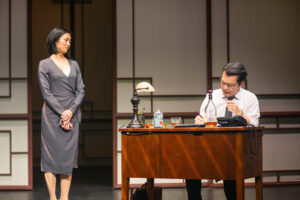
In the first meeting where Peter introduces Daniel to the Culture Minister who will make the yes or no decision concerning the signage contract, Daniel finds a stone-faced foe who has silently watched from the side the initial chit-chat, silly misinterpretations, and outlining of credentials. When she finally speaks, the Cultural Vice Minister, Xi Yan, says with apparent bite and resentment, “We must not be so foolish to turn to a foreigner to solve our problems.”
Nicole Tung is the evening’s star among an overall stellar cast as she portrays the stunningly sophisticated and stylish Xi, a woman very much in control of the men around her without their ever really comprehending until it is too late. Her opening jabs at the American wanna-be suddenly and surprisingly shift into promises to help in his negotiating with her boss the desired contract. Their new friendship quickly slips into something much more sexy and tantalizing as the two find themselves in his hotel room – actually in his bed – ready for further collaboration of every sort imaginable. And all along the way, it is so clear it is she who is in the driver’s seat of what is to happen next.
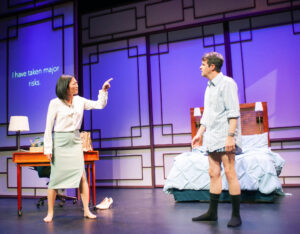
Nicole Tung shines as her Xi shows a mastery in maneuvering through the complex maze of relationships that are necessary in order to stay afloat and to succeed in the convoluted mixture of business, cultural, personal, and political relationships pervading the world of modern China. Together with Michael Austin, the two insert a wide range of intrigue, heart, pathos, and sheer and stubborn determination in their individual and joint portrayals. They also produce the evening’s funniest moments in the midst of panting eroticism as Daniel attempts to say “I love you” in a language where one word can have many meanings with just the slightest shift in tone, the result being non-sensical phrases better to hear live than now to read in a review.
As the Culture Minister Cai Guoliang who smilingly assures Daniel that he wants a deal while on the side demanding Xi to get rid of the ridiculous American, Alex Hsu bombastically and precariously walks a tightrope trying to appease first one and then the other of the consultant Peter whom he owes a big favor, of a Party official who frequently interrupts by phone to demand acrobats for an upcoming event; and of an unseen wife who demands in no uncertain terms her sister’s husband’s signage company wins the bid. The Minister’s dilemma is hilarious to watch Alex Hsu play out until suddenly its end demonstrates just how dangerous the landscape of Chinese business negations can actually be.
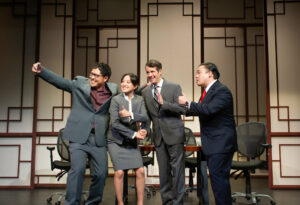
Chinese interpreters pop in and out of the many scenes as each only gets louder, more stubborn, and more inept in their attempts to bridge the two languages. Hats off to Sharon Shao, Phil Wong, and Xun Zhang – all of whom are hired and fired as interpreters only to reappear with fun and flair in other roles. All three are especially riotous when a judge (Phil Wong), a prosecutor (Sharon Shao), and an interpreter (Xun Zhang) transform a formal business meeting into a room of giddy, gossipy gigglers who only want to acquire a selfie with someone they perceive as a genuine headliner of world-famous corruption.
Andrea Bechert has created an exquisite scenic setting in which the many scenes of Chinglish flow seamlessly. Large Chinese panels slide back and forth to establish impressive backdrops for Daniel’s lecture and then to shift into walls of a conference room, entrances to cafes, or curtains opening to a hotel bed where hot negotiations of all sorts are pantingly occurring. The lighting of Wen-Ling Liao highlights beautifully each new scene as the properties designed by Micaela Kieko Sinclair add just the right touches to the set pieces that actors and stagehands glide into place, often with a comic twist, smirk, or wink to the audience. Becky Bodurtha’s costumes establish the formality of Chinese business meetings and the elegance of Xi’s position and personal taste while also allowing the three, comical interpreters to don outfits accentuating their hilarity. Finally, James Ard’s sound design includes ongoing interludes of the beats and sounds of modern, Chinese music, reminding us (along with all the play’s spoken Chinese) that we as an American audience are visitors in a foreign land.
Much more than when David Henry Hwang’s brilliant and biting Chinglish first appeared on the American stage in 2011, San Francisco Playhouse’s staging in 2023 reminds us that for all our differences that are every day so stressed in the media and by politicians, there are so many ways – both good and bad – that modern China and U.S. are in fact alike. The playwright also clearly warns us that any attempts to think we are in any way superior to our neighbors to the East are at best naïve and at worse, just plain ignorant.
Rating: 5 E
A Theatre Eddys Best Bet Production
Chinglish continues through June 10, 2023 in production by San Francisco Playhouse, 450 Post Street, San Francisco. Tickets are available online at www.sfplayhouse.org or by phone at 415-677-9596.
Photo Credits: Jessica Palopoli
